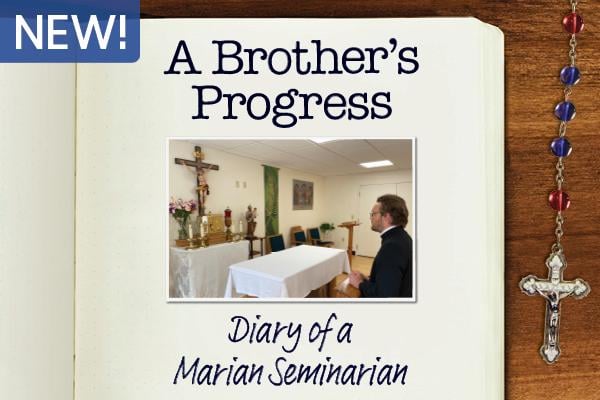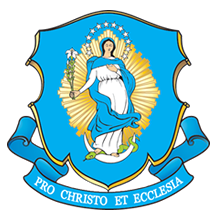
The reading from St. Faustina’s Diary drew my attention back sharply to the heart of my calling. The religious life is the way I personally can best give myself to God and to others; for me, it is the way of love.
Welcome to article 31 of a weekly series on the formation journey of Br. Josh, MIC, a second-year seminarian at the Marian House of Studies in Steubenville, Ohio. It is the continuation of Br. Josh's previous column, "Novice Notes."
By Br. Josh, MIC
On May 15, the evening before the feast of St. Andrew Bobola (1591-1657), I was sitting in a pew in the National Shrine of The Divine Mercy in Stockbridge, Massachusetts. I had been talking with my friend, Br. David Bugajski, about this great Jesuit martyr whose feast we would soon be celebrating together at the only church dedicated to St. Andrew Bobola in the United States. It was a 90-minute drive away in Dudley, Massachusetts.
Brother David told me how Cossacks tortured Bobola brutally for hours with torches, daggers and scourging before killing him, while Bobola forgave and prayed for them. Saint Andrew became the patron saint of Poland. He converted thousands of people to the Catholic faith before his death, and numerous miracles were attributed to him.
“You are that saint”
“Lord, say something to me.” I prayed as I opened St. Faustina’s Diary at random. The first passage I read (#1650) described St. Faustina’s reaction to reading about St. Andrew Bobola’s canonization in April 1938! She wept because God had generously made this man a saint, but God had not given any saint to her Congregation.
“I know Your generosity,” she said to the Lord, “and yet it seems to me that You are less generous towards us.”
Jesus told her, “Don’t cry. You are that saint.”
The words struck me by reminding me of something very simple and basic, at the roots of my vocation: I, too, want to be a saint.
It is possible to get a bit distracted from one’s primary aim by all the things going on or needing to get done, and my attention had drifted a bit toward earthly concerns, not anything bad, but also not what is most good. The reading from St. Faustina’s Diary drew my attention back sharply to the heart of my calling. The religious life is the way I personally can best give myself to God and to others; for me, it is the way of love.
The greatest martyr
The following evening, Br. David and I spent the day visiting his mother Jolanta and Uncle Dan. Jolanta was very generous, cooking wonderful meals for us and giving keen attention to any need or desire we had. We went to the church of St. Andrew Bobola that evening.
The pastor, Fr. Krzysztof Korcz, told us the story of St. Andrew and his involvement in their church, including signs and miracles. Father Krzysztof shared how Ven. Pope Pius XII called Bobola the “greatest martyr” and the bishop read Pope Francis’ apostolic blessing to all who prayed the novena to St. Andrew. A woman in front of the church described how St. Andrew healed her of Stage 3 colon cancer.
About fifty years his death, St. Andrew appeared to a sacristan at Pinsk College in Poland and showed him where his body lay buried. When the corpse was exhumed, it was found to be incorrupt. In the 1980’s, St. Andrew began showing up in apparitions at his childhood home in Strachocina, asking for his devotion to be spread. The shrine received over 2,000 testimonies of graces received through his intercession, the most powerful of which may have been the healing of a child with an enlarged head.
A very tiny crumb
During a short meditation before the Mass, I saw in my mind a paten with a Eucharistic host on it, and a very tiny crumb lying beside the big host. Could the Lord be telling me I was that crumb, capable of nothing on its own, but offered with Him?
In the Gospel for the Mass, Jesus said that He wanted all His disciples to be one, one with one another, with Him and with the Father, perfectly one.
This is what the desire to be a saint is all about, to be perfectly one with Jesus, a tiny crumb of Him, to be Him in the world. I prayed to St. Andrew Bobola to intercede for me – indeed, for all of us – that we would become saints.
Next: "The Controversial Hymn."
Previous entry.
{shopmercy-ad}
















